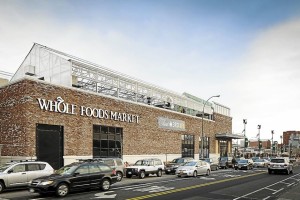by AFP Relaxnews, The Star Online, January 13, 2014

Rooftop farming at Whole Foods Market in Brooklyn
Photo: Gotham-Greens / AFP
Source: www.thestar.com.my
Agriculture reaches for the skies in New York’s pioneering commercial greenhouse atop a supermarket.
Will supermarkets soon be growing their own produce on the roof? It might sound unusual, but it could be the future of the food commerce industry as the urban farming trend goes high-rise and spreads to metropolises all over the world.
One of the latest companies to test out the concept is global chain Whole Foods, which opened its first Brooklyn location Third and 3rd last month, featuring a 20,000-square foot (about 1,860sq m) greenhouse on the roof.
Designed, built and operated by urban agricultural specialist Gotham Greens, the project is thought to be the first commercial-sized greenhouse integrated into a supermarket.
The greenhouse will produce over 200 tonnes of fresh produce, including leafy greens and tomatoes, per year, and recirculating irrigation systems will capture water for re-use. It is the second New York construction by Gotham Greens, following a 15,000-square foot (about 1,400sq m) rooftop greenhouse built by the company in 2010.
“This project takes the discussion from food miles to food footsteps,” said Viraj Puri, Gotham Greens co-founder. “Our greenhouse will provide Whole Foods Market shoppers with access to the freshest, most delicious leafy greens, herbs and tomatoes, year-round that will be grown right above the store’s produce department.”
Whole Foods isn’t the first retailer to try out the idea; in 2012 the Rouses Market in New Orleans (US) unveiled “Roots On The Rooftop” – an aeroponic urban farm which grows herbs such as basil, parsley and cilantro to sell downstairs in the grocery store’s main building. The “tower garden” is a soil-free zone, with water pumped through pillars to grow the plants.
“Aeroponics makes sense for the space,” said Rouses culinary director Louis “Jack” Treuting at the time. “It is lighter than soil-based operations, and the towers recycle water and liquid nutrients through their own reservoirs, so they’re sustainable.”
Urban agribusinesses are becoming a truly global concept, as demonstrated by the success of the Sky Greens project in Singapore, a series of nine-metre-high towers which produce fresh produce to be sold in local supermarkets. In a country which imports almost 95% of its fresh fruit and vegetables, the concept is revolutionary, and since the project became operational in 2012 the produce has been flying off the shelves despite costing around 10% more than the imported equivalents.
A quirky twist on the trend can be seen in Japan, in the form of the nine-storey corporate Pasona Group office in downtown Tokyo, which acts as a sort of vertical garden and produces food which is directly served to its employees in the staff canteen. Constructed in 2010, the building’s double skin green façade reduces energy use and is also draped in foliage from strategically planted orange trees, while over 200 species of plants, vegetables and rice are grown in meeting rooms and offices throughout the building.
Meanwhile Gotham Greens is planning a third rooftop greenhouse in the Queens area of the city, slated to start crop production in 2014. The concept of high-rise urban farming is a slow grower, but it might just take off.